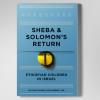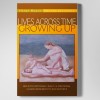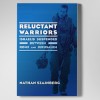Feb. 17, 2006 Leg Hopper in the Persimmons
Something about working in the persimmon orchards gets the writing into me.
Today, despite a partially severed Achilles tendon, after ice pack, much anti inflammatories and Linus Pauling dosages of Vitamin C, I am off. The bus is beaten by my favorite, the Sheirut Monit. (Pronounced as in the Old West term for stogies, Cheroot). I hop on (hopping being a current mode of travel on my left foot) and sans newspaper, sans reading glasses, sans full wakefulness, daydream the route to the kibbutz. The woman just in front of this 10-seater van is making herself up. I wonder of this, as I see her wedding ring. She is meticulous, mirror balanced on two fingers, works with concentration. She needs little beauty help, with her slightly olive-green tint of skin, but — as woman have wont — does look more beautiful after her “do.”
Moshek, kibbutz agricultural manager, is always enthusiastic when I call on arrival. I read the word “karkar” on the Glil Yam welcome sign — it is an archaic term for “founded.” I also glance at the signs pointing to various companies leasing space from the kibbutz — DHL is here, as is some high-techy place. Then there is the “biton,” which I later learn is the kibbutz’s own cement factory; this kibbutz and these kibbutzniks have very fundamentally built this country and in ways not deeply appreciated today. Moshek arrives in one of his dust-crusted diesel-powered trucklets. His handshake, this 68 year-old, rail-thin former Navy Seal, a man whose abdomen is noticeably hollow beneath his work shirt, is bone-hardened, firm. We’re off. I mean to ask him something about energy collaboration with the Swedish government, but these matters evaporate from my head this early in the a.m. and in the face of his greeting: the last of the Zionists, he calls me. But, I tell him there are more of us. He likes, “us.” We join the two Thai workers — Shay is out ill, Moshek says. (Tomkap later tells me that Shay has sore muscles, not from work, but from weightlifting.)
I come with an unspoken sense of guilt that when I was here last, just before my sojourn in the States, and upon my list picking of avocados, the Fuerte species, I mistakenly pulled many off their branches, and cut others leaving stem intact. I learned after I was done, that those I picked — sans stems — cannot be graded for export, are doomed for the local shuk. As I left, I glanced at the crate of stemless Fuertes, which like Samson, once shorn were of secondary strength, and felt remorse. I am determined today to be a better worker.
We tree trim today. I see how doing agriculture brings you closer to the seasons, brings me. How much I need prepare for that penultimate moment –picking in September — before that ultimate moment — the last temptation of eyes at Gristedes or Whole Foods, before you taste.
So, we trim. I am more cautions here with my gimp leg. The rains in the last few days have created gullies in some of the old tractor tracks. These take to mind the gullied ponds that MC. Escher drew, which reflected back the trees, the clouds and within which he planted a carp; after a bit, you realize you are seeing the reflections and are looking at a gully which somehow has been filled with a carp, or some such fish with barbs.
But I will not be distracted by such mind wanderings. I am a cutter today, a trimmer, a man who will shape trees to bring light unto their lower branches. We bypass Shin, who is working the chain saw, and join Tomkap with long-handled pruners, as I am so armed. Moshek takes a moment longer to show me the principles: if more than three branches off a node, I must trim; if branches are too crowded (jeopardizing unborn fruit which will later bump and grind each other, defect their brethren), I must thin. I am to follow Tomkap. This is fine with me, although I notice after Moshek leaves, that Tomkap has a much coarser style of pruning, more akin to slash and burn agriculture. The two Thai workers as usual are masked with T-shirts. I watch, after their snacks, how they don these. It seems to
be a finer form of cotton, dark, with the face peeking through the neck hole; the short-sleeve arms are then tied in a double knot behind the cranium, about the skull’s crest. The eyes and nose are revealed. On top, a hat is perched.
But before Moshek leaves, he notices that I “Mitlabet,” am indecisive. He encourages decisiveness.
I find myself thinking of Steiner, the founder of Theosophy, speculating with perhaps a touch of envy, on how plants have the better of us: they concentrate on growing, while we busy ourselves with other matters, such as consciousness, love, work and such. This tree is interested in simply branching out, getting its sap moving after winter’s sluggishness, popping fruit and getting such popped fruit propagating more trees.
Also, as I trim, I cinch up my decisiveness by remembering that an error her, an over-trimming there, is correctable for the most part by these trees. (We have 8,000 to trim, I remind myself as I find my mind-meanderings interfering with my prunings.) If we could only be a bit more treelike: prune off those parts that sap our energies (these “sappers” that come off the trunk and will not bear fruit); lop off extraneous branches that unbalance our symmetries (and interfere with the tractor); eliminate cross-branches that crowd out each other, diminish the fruitfulness of the overall tree. If only we could do such prunings in an unpainful manner, knowing that our overall growth will bear more fruit. And if an error be made, so be it; starfish-like we could pop out another branch.
But we are not so treelike. Our souls would not bear the lopping Imeet out to these persimmon trees, very distant cousins.
The sun is firm. Even at 8 a.m., I remember how Moshek taught me to have my back to the sun as I was persimmon selecting, so as not to be eye-worn. So too, I learn to get my back up-sun so I can see better where my next victims are, so I can see better the overall crown of the tree. I should, after a good pruning, be able to look up through the tree crown and see an unobscured arbor, without much shading by the limbs, without limbs crossing each other, without much “Tz’fi’fut,” crowding. No tenements here. Trees to bear fine fruit will not tolerate tenements.
But my lopping style is more conservative than Topkat’s, I mean Tomkap’s. (I slip to Topkat, thinking of the giant Chinaman in the James Bond movie, who tries to decaptitate Bond with a cast of his knife-edged Bowler.) He goes for the limb, goes at the origins, trims the sappers off the trunks. I start from the outer reaches and work inwards. At times, I find I have handsomely trimmed a few branchlets, only to find that Tomkap has preceded me and the limb has already been severed and is simply resting against another, has not fallen. I learn to check for severed limbs first.
By 1100, the sun, once too warm for my Land’s End yellow jacket, is now hidden by clouds, a few drops fall, we wait for Moshek to go to the next orchard. As we wait, Tomkap takes a tiredeness; slips into one of the large, square receptacles, once filled with persimmons or avocados, pulls his sweat shirt hood over, and promptly naps. Clouds gather threateningly, I pace, stretch my Achilles and we wait. But my Achilles, that tendon that made vulnerable this Greek hero, is wearing me down from my conquests.
I head back with Moshek. I remember to talk with him about my idea with Kamella, who works at the Swedish embassy and is in my class, about biofuels. Moshek, as if primed, takes off with three types of plants that produce much oil. The macadamia nut is 97% oil; ladies won’t eat it anymore, even though Moshek thinks it tastes wonderful. He is surprised that it is so expensive in Hawaii. Hawaii and New Caledonia (or some such Pacific isle) have taken over the remaining market of ladies who don’t give a damn about oils. He, Moshek is left with an orchard of fatty nuts. Also something called Haria, which is faster to grow. We plan, even scheme. I am energized. He unloads me with a few pounds of avocados. And I hop, one-legged mostly, onto a Sheirut home.



